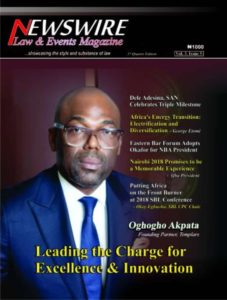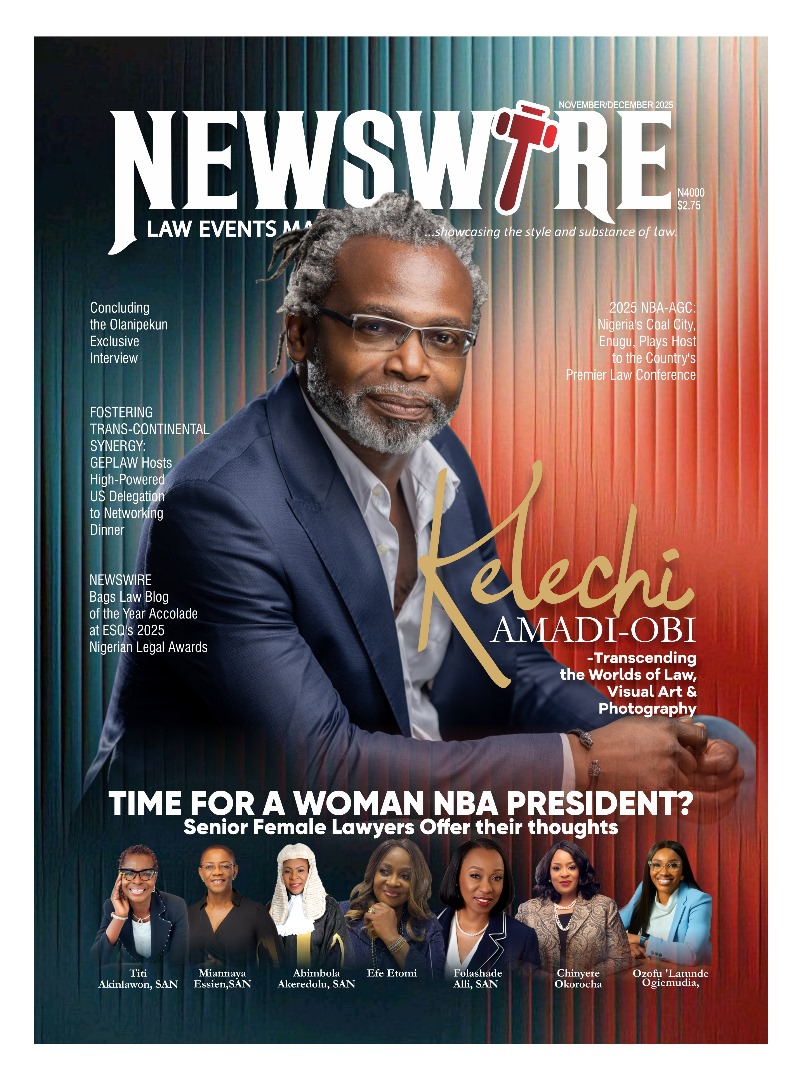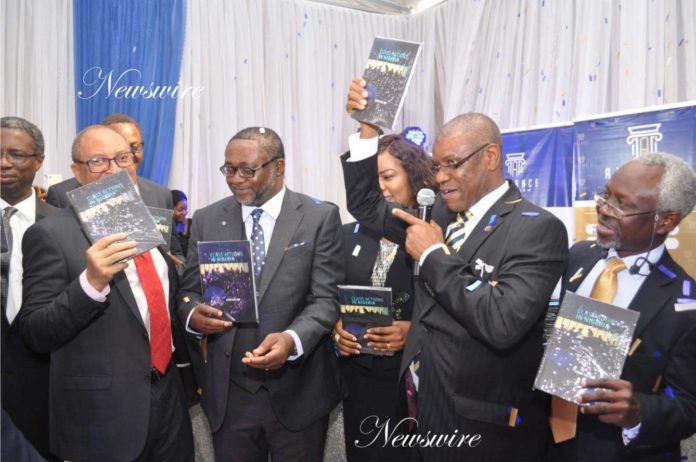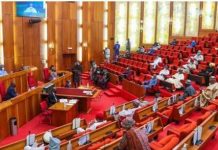Experts Share Ideas on Corporate Governance at Alliance Law Firm’s Maiden Lecture in Lagos
On Thursday, May 31, 2018, the magnificent grounds of the prestigious Radisson Blu Hotel in Lagos, saw an equally distinguished cast of highly accomplished leaders from the worlds of industry, government and the academia, gathered to explore the current state and future directions of corporate governance in Nigeria.

According to the NEWSWIRE Magazine’s correspondent in Lagos, the occasion was the maiden lecture on the subject of contemporary governance issues in the country, by Alliance Law Firm, a leading firm of legal practitioners whose stated mission is to establish a world class, full-service Nigerian partnership distinguished by its premium service which incorporates a rich blend of traditional legal practice with the dynamism required to satisfy the constantly evolving dynamics of business in its result-oriented services. Alliance prides itself on its strengths in a diverse array of the law such as corporate and commercial law, energy and natural resources, dispute resolution, telecommunications, foreign investment, shipping and maritime law, aviation, taxation, commercial litigation and project finance.
In his remarks of welcome, the Managing Partner of Alliance Law Firm, Uche Val Obi, SAN, described the lecture series as one of his firm’s corporate social responsibility (CSR) projects designed to create a positive social impact and contribute to nation building, as well as create a platform for the exploration of topical issues of national concern. He praised the current administration’s efforts at improving governance in the Corporate Nigeria as a means of enhancing the country’s ease-of-doing-business profile, adding that these measures would attract a larger inflow of foreign investment into the nation’s economy – and in the process throw the critical issues of corporate governance into sharper relief.
Also speaking, the Hon. Justice Ejembi Eko of the Supreme Court of Nigeria – who represented the Chief Justice of Nigeria, Hon. Justice Walter N. Onnoghen – called for participatory and interactive deliberations, pointing out that not only does it take the brightest and best to disseminate the best ideas, but it also takes the brightest to best to process and interpret these ideas correctly. He described gatherings like this as a convergence between wealth in terms of finance and assets, and wealth in terms of rights and liberties, saying such a convergence can only be of benefit to the nation and its people.
The Lead Speaker at the event, Mr. Adedotun Sulaiman, chairman of the Financial Reporting Council of Nigeria, focused most of his remarks on the forth-coming release of the revised regulations (or codes) designed to enhance transparency and better disclosure practices among public and private sector firms in Nigeria. Describing the new code as a ‘principles-based’ one – as opposed to a strict compliance-based one – he listed 28 governance principles, under which there are 200 recommended practices, that companies are advised to adhere to.
Mr. Sulaiman’s presentation was followed by a panel discussion on critical issues in corporate governance in Nigeria. The panel, which was chaired by Prof. Pat Utomi, a leading political economist and management expert who, until served as the director of Lagos Business School. Voted among Nigeria’s Top Ten Living Legends by one of Nigeria’s leading media organizations, Utomi has served on the boards of a host of Nigerian and international business, educational and professional bodies. He was joined by Prof. Fabian Ajogwu, SAN, also of the Lagos Business (who is also the Founding Partner of the law firm, Kenna Partners; the acting director-general of the Securities and Exchange Commission (SEC), Mrs. Mary Uduk, who was represented by Mr. Edward Okolo; the director-general of the Federal Office of Budget and Management, Mr. Ben Akabueze (who was represented by Mr. Gabriel Okon); Austin Avuru, the chief Executive Officer of Seplat Petroleum Development Company; and Mrs. Oluwatoyin Sanni, who is the Group Executive Officer of United Capital Plc.
Opening the panel discussion, Prof. Utomi expressed the view that the ability to engage the goodwill of all stakeholders – not just its shareholders – should be embedded in the DNA of corporate culture, and asked why this was not the case at present, especially among top corporate executives.
In his contribution, Prof. Ajogwu asserted that sustainability, which is the key objective of good corporate governance, demands that there be a separation between ownership and management, urging corporate organizations to do away with what he called the ‘head office mentality,’ a phenomenon which, he said, kills initiative and morale among lower cadres in the corporate echelons. Every company, no matter its size, must have a board, Ajogwu insisted. He concluded with a poser: Who really runs the company? Is it the management, or the board? In a well-governed corporate entity, he said in answer to his own question, it should be the management.
In his contribution, Okolo (representing the SEC D-G) reminded everyone that there is a cost to good corporate governance – a cost which some executives are not willing to pay, especially when they see no particular incentives to do so. He therefore called on policymakers to institutionalize these incentives – in the form of tax holidays, positive segregation, contracts, and so forth – in a bid to foster the emergence of a good corporate governance culture.
Okon (representing the federal budget director Akabueze) spoke at length on current efforts by the Federal Government in particular to institute a good corporate governance culture among public sector establishments – a prime example being the Remittance Management Framework, among others.
On his part, Mr. Austin Avuru of SEPLAT began with a pointed question: How many Nigerian companies can you point to, that can boast of a consistently good record of performance for the past 20 years? The answer, he suggested, can be found in the presence or absence of a corporate governance culture. In the end, he continued, it all comes down to the senior executives asking themselves a simple but fundamental question: How can we save this company from OURSELVES? Using his firm, SEPLAT, as an example, Avuru went on to prescribe measures such as his company ‘prevent, detect and resolve’ process in containing crises, including arising from the abuse (or likely abuse) of related party transactions, among others.
The only female panelist, Mrs. Sanni of United Capital Plc echoed Prof. Ajogwu’s position about institutionalizing a corporate governance culture in an organization, regardless of its size. As the company grows, she said, this culture will become deeply entrenched in the company’s DNA. She also referred to what she called ‘the tone at the top’ of any company’s hierarchy as a barometer of that company’s corporate governance health, and said that tone must change – if sustainability is the aim of such a company.
The panel discussions were followed by a question-and-answer session, in which number of attendees expressed their concerns and interest in areas such as the convergence of regulatory laws as presently being codified in the laws of the Financial Reporting Council of Nigeria; the punitive nature of previous codes, and gender inclusiveness, among others. In his response to these questions, FRCN chairman, Mr. Sulaiman, assured that most sectoral codes would be sector-specific. He went on to say that his organization was gender – and diversity-sensitive in its internal structure as well as its engagements with external stakeholders. On the issues of punitive versus corrective sanctions, Sulaiman assured the assembled guests that his organization operations with the understanding that Nigerians will naturally respond to incentives, and therefore if a business runs foul of the FRCN’s more discretionary rules, but can prove convincingly, it behoves on such a company to EXPLAIN its actions to the relevant authorized authority, as well as how such a rule does not apply to such a company.
NEWSWIRE’s correspondent reports that another highlight of the occasion was the formal presentation of a book titled ‘Class Actions in Nigeria.’ Written by Mr. Uche Val Obi, SAN, the book was reviewed by another Senior Advocate of Nigeria in the person of Prof. Gbolahan Elias, who described the book as full of insights which have helped debunk quite a number erroneous impressions and notions popularly held by lawyers – including the reviewer himself. The formal presentation was performed by Hon. Justice E. Eko (the representative of the nation’s Chief Justice of Nigeria) who was joined by other dignitaries amidst a shower of confetti.
A vote of thanks by Suleiman Yunusa brought the event to a formal close.
See Photos below:



























Subscribe for your copy/copies now

Do you need to be heard? Or your articles published? Send your views, messages, articles or press release to: newswiremagazine@yahoo.co.uk >>> We can cover your (LAW) events at the first Call: 08039218044, 08024004726
-Advertisement-
Grab our latest Magazine, "Kelechi Amadi-Obi - Transcending the worlds of Law, Visual Art and Photography". Get your order fast and stress free.
For more details about Newswire Law&Events Magazine, kindly reach out to us on 08039218044, 09070309355. Email: newswiremagazine@yahoo.co.uk. You will be glad you did
Download E-MagazineDo you want to be heard, your events covered, your articles published, or need to advertise your products and services on our Blog and Magazine, reach out to us at Newswire Law and Events, you will be glad you did. For more details about our services, please call: 08039218044, 09070309355. Email: newswiremagazine@yahoo.co.uk








